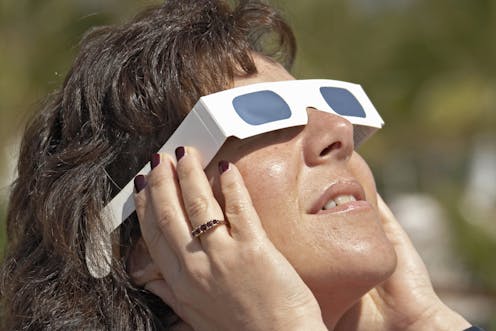
Don’t trust. Verify. Andrew Holt/The Image Bank via Getty Images
Americans from Maine to Texas are set for a rare treat on April 8, 2024, when a total solar eclipse will be visible across much of the U.S.
In ancient times, eclipse-viewers thought they were watching the Sun be eaten by wolves, a dragon or a demon.
Of course, we now know that the Sun isn’t really eaten during an eclipse. Instead, it does what it always does: rain ultraviolet rays on everything in its path. That’s why you should never look at a solar eclipse without protective eyewear.
But not just any eyewear will do. To make sure that you enjoy the total solar eclipse safely, the American Astronomical Society has specifically warned against buying eclipse glasses at the lowest price from online marketplaces like Amazon or eBay.
What gives? Why not save a buck on something you’ll use possibly just once for a few minutes?
It turns out there’s a very good reason: Deceptive counterfeit products have infiltrated retail supply chains. And some of them can pose a threat to your health.
Invasion of the bogus products
As experts in supply-chain management, we know that counterfeit products have become a growing problem in recent years.
While counterfeit products can be found at brick-and-mortar shops, they’re an especially big problem at online marketplaces. Amazon removed more than 6 million counterfeit items from its supply chain in 2022 alone.
There are several reasons for this. First, our recent research shows that consumers often consider the reputation of an online retailer while judging a product’s quality. Unscrupulous third-party sellers can take advantage of this fact by selling their wares through a reputable online marketplace.
Another complication arises from the fulfillment services offered by some marketplaces, such as Amazon, where third-party sellers directly send their merchandise to the online retailer’s warehouse for shipping and handling. These sorts of fulfillment services offer a little-known benefit to retailers: If a product is running out of stock, they can “borrow” from a third-party seller’s inventory.
Unfortunately, this also means that a consumer who agrees to buy from one retailer may actually receive merchandise – perhaps counterfeit – from a third-party seller. While there aren’t statistics showing how frequently this happens, there’s evidence it’s a significant problem.
Thankfully, customers are becoming more aware of counterfeit products and have increasingly pushed online retailers to separate inventories of authorized sellers of merchandise from those that aren’t. For instance, Amazon maintains a list of “gated” brands, such as Asics and Under Armour, that require authorization before they can be sold.
But these protections don’t apply across the board. In fact, some counterfeit-prone brands, such as Birkenstock, refuse to sell their products through some online retailers entirely. That leaves an opening for counterfeiters, who tend to offer the lowest prices.
That’s why the American Astronomical Society recommends eclipse-watchers avoid buying protective glasses from the lowest-price sellers on online marketplaces. And we completely agree. After all, counterfeit sunglasses can be returned, but damage to your eyes is permanent. In 2017, one California man wearing counterfeit eclipse glasses was left with retina damage.
How to find safe solar eclipse glasses
If you’re in the market for eclipse glasses, it’s not hard to get a safe pair. First, buying directly from one of the American Astronomical Society’s approved list of brands and manufacturers is the most reliable way. Unfortunately, many of them only sell cheaper, disposable solar eclipse viewers in bulk.
If you need a single pair, your next best option is to purchase one from a major brick-and-mortar chain retailer in person. Many organizations are also handing out free viewers. If you take one, you should make sure it was made by a manufacturer on the American Astronomical Society’s list.
If you must buy from an online marketplace, look for evidence of manufacturer authorization. For instance, American Paper Optics – an American Astronomical Society-approved brand – maintains a list of Amazon sellers approved for reselling their viewers.
What if you’ve already bought something from a no-name seller on Amazon? Let’s say you bought a pair of sunglasses, or eclipse glasses, with UV protection. It’s hard to verify UV protection properties. Sure, there are standards and certifications such as UV400 and ISO 12312-2, but as you have probably guessed, even those can be faked. For instance, you can easily buy entire rolls of UV400 stickers online.
Thankfully, most local opticians can test your sunglasses’ UV protection properties in seconds. In other words, when in doubt, verify.
The authors do not work for, consult, own shares in or receive funding from any company or organization that would benefit from this article, and have disclosed no relevant affiliations beyond their academic appointment.
Advertisement

Advertisement
Contact Us
If you would like to place dofollow backlinks in our website or paid content reach out to info@qhubonews.com











